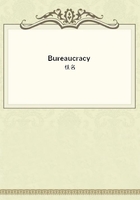
第50章 THE WORMS AT WORK(1)
Rabourdin's bureau was during his absence a prey to the keenest excitement; for the relation between the head officials and the clerks in a government office is so regulated that, when a minister's messenger summons the head of a bureau to his Excellency's presence (above all at the latter's breakfast hour), there is no end to the comments that are made. The fact that the present unusual summons followed so closely on the death of Monsieur de la Billardiere seemed to give special importance to the circumstance, which was made known to Monsieur Saillard, who came at once to confer with Baudoyer.
Bixiou, who happened at the moment to be at work with the latter, left him to converse with his father-in-law and betook himself to the bureau Rabourdin, where the usual routine was of course interrupted.
Bixiou [entering]. "I thought I should find you at a white heat! Don't you know what's going on down below? The virtuous woman is done for!
yes, done for, crushed! Terrible scene at the ministry!"Dutocq [looking fixedly at him]. "Are you telling the truth?"Bixiou. "Pray, who would regret it? Not you, certainly, for you will be made under-head-clerk and du Bruel head of the bureau. Monsieur Baudoyer gets the division."Fleury. "I'll bet a hundred francs that Baudoyer will never be head of the division."Vimeux. "I'll join in the bet; will you, Monsieur Poiret?"Poiret. "I retire in January."
Bixiou. "Is it possible? are we to lose the sight of those shoe-ties?
What will the ministry be without you? Will nobody take up the bet on my side?"Dutocq. "I can't, for I know the facts. Monsieur Rabourdin is appointed. Monsieur de la Billardiere requested it of the two ministers on his death-bed, blaming himself for having taken the emoluments of an office of which Rabourdin did all the work; he felt remorse of conscience, and the ministers, to quiet him, promised to appoint Rabourdin unless higher powers intervened."Bixiou. "Gentlemen, are you all against me? seven to one,--for I know which side you'll take, Monsieur Phellion. Well, I'll bet a dinner costing five hundred francs at the Rocher de Cancale that Rabourdin does not get La Billardiere's place. That will cost you only a hundred francs each, and I'm risking five hundred,--five to one against me! Do you take it up?" [Shouting into the next room.] "Du Bruel, what say you?"Phellion [laying down his pen]. "Monsieur, may I ask on what you base that contingent proposal?--for contingent it is. But stay, I am wrong to call it a proposal; I should say contract. A wager constitutes a contract."Fleury. "No, no; you can only apply the word 'contract' to agreements that are recognized in the Code. Now the Code allows of no action for the recovery of a bet."Dutocq. "Proscribe a thing and you recognize it."Bixiou. "Good! my little man."
Poiret. "Dear me!"
Fleury. "True! when one refuses to pay one's debts, that's recognizing them."Thuillier. "You would make famous lawyers."
Poiret. "I am as curious as Monsieur Phellion to know what grounds Monsieur Bixiou has for--"Bixiou [shouting across the office]. "Du Bruel! Will you bet?"Du Bruel [appearing at the door]. "Heavens and earth, gentlemen, I'm very busy; I have something very difficult to do; I've got to write an obituary notice of Monsieur de la Billardiere. I do beg you to be quiet; you can laugh and bet afterwards."Bixiou. "That's true, du Bruel; the praise of an honest man is a very difficult thing to write. I'd rather any day draw a caricature of him."Du Bruel. "Do come and help me, Bixiou."
Bixiou [following him]. "I'm willing; though I can do such things much better when eating."Du Bruel. "Well, we will go and dine together afterwards. But listen, this is what I have written" [reads] "'The Church and the Monarchy are daily losing many of those who fought for them in Revolutionary times.'"Bixiou. "Bad, very bad; why don't you say, 'Death carries on its ravages amongst the few surviving defenders of the monarchy and the old and faithful servants of the King, whose heart bleeds under these reiterated blows?'" [Du Bruel writes rapidly.] "'Monsieur le Baron Flamet de la Billardiere died this morning of dropsy, caused by heart disease.' You see, it is just as well to show there are hearts in government offices; and you ought to slip in a little flummery about the emotions of the Royalists during the Terror,--might be useful, hey! But stay,--no! the petty papers would be sure to say the emotions came more from the stomach than the heart. Better leave that out. What are you writing now?"Du Bruel [reading]. "'Issuing from an old parliamentary stock in which devotion to the throne was hereditary, as was also attachment to the faith of our fathers, Monsieur de la Billardiere--'"Bixiou. "Better say Monsieur le Baron de la Billardiere."Du Bruel. "But he wasn't baron in 1793."
Bixiou. "No matter. Don't you remember that under the Empire Fouche was telling an anecdote about the Convention, in which he had to quote Robespierre, and he said, 'Robespierre called out to me, "Duc d'Otrante, go to the Hotel de Ville."' There's a precedent for you!"Du Bruel. "Let me just write that down; I can use it in a vaudeville.
--But to go back to what we were saying. I don't want to put 'Monsieur le baron,' because I am reserving his honors till the last, when they rained upon him."Bixiou. "Oh! very good; that's theatrical,--the finale of the article."Du Bruel [continuing]. "'In appointing Monsieur de la Billardiere gentleman-in-ordinary--'"Bixiou. "Very ordinary!"